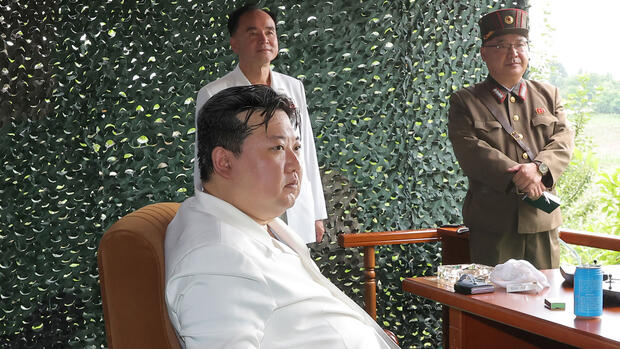Will there be a meeting with Japanese Prime Minister Kishida?
(Photo: dpa)
Tokyo North Korea’s leader Kim Jong Un has usually rejected offers of talks from the United States and South Korea. Now, however, everything indicates that US ally Japan could still achieve a diplomatic breakthrough with a lone initiative. According to current Japanese media reports, Prime Minister Fumio Kishida is working on getting Kim to the negotiating table. It would be the first bilateral summit in 21 years.
Kishida would have two reasons for such an initiative:
- North Korea is currently becoming a real threat with its missile tests.
- Japan’s prime minister is looking for foreign policy success to boost his falling popularity ratings at home.
According to Kim Soo, North Korea expert at the US think tank Rand Corporation, such a conversation would give Kishida a unique selling point: “Neither the US nor South Korea and North Korea seem to have an appetite for a summit meeting.”
So far, North Korea’s dictator has attracted more attention with loud saber-rattling than with moderate diplomatic tones, but according to political observers Kim may actually have an interest in reviving relations with Japan.
So far, ruler Kim Jong Un has had to watch helplessly as the balance of power in Asia shifts in favor of the United States. The US allies South Korea and Japan are drawing closer together in order to form a strong counterweight to Russia, China and North Korea together with the US.
According to media reports on Thursday, the USA now even wants to hold a summit meeting with its two Asian allies, Japan and South Korea. US President Joe Biden wants to meet Kishida and South Korean President Yoon Suk Yeol on August 18 in Camp David near Washington, South Korean and Japanese news agencies reported, citing government circles.
The Japanese Prime Minister is looking for foreign policy successes to boost his popularity ratings in Japan.
(Photo: AP)
The meeting is likely to include North Korea’s repeated missile launches. North Korea fired two ballistic missiles again on Wednesday after a US nuclear submarine arrived in South Korea. Shortly before North Korea’s missile launch, a US soldier illegally crossed the inner-Korean border into North Korea and was arrested there.
>> Read here: US soldier crosses border into North Korea and is apparently arrested
UN decisions prohibit internationally isolated North Korea from testing ballistic missiles of any range. Depending on the design, such rockets can also be equipped with a nuclear warhead.
Although tensions on the Korean peninsula have recently increased significantly, North Korea has recently been sending out signals that could be interpreted as a sign of a willingness to talk. When North Korea shot a military satellite into space in violation of UN sanctions in May, the country – unlike previous missile launches – informed the Japanese coast guard, as required by the International Maritime Organization (IMO). In addition, North Korea’s Deputy Foreign Minister Pak Sang Gil signaled on the same day that the regime would explore Kishida’s willingness to talk.
Consultations between the UN command and North Korea are taking place in the border town of Panmunjom. The border between North and South Korea runs through the middle of the blue barracks that serve as a meeting point.
(Photo: action press)
Atsuhito Isozaki, professor at Japan’s Keio University, discussed North Korea’s more open attitude in a specialist magazine. “It is remarkable how gentle the tone of the North Korean satellite launch statement was.” In fact, the North Korean propaganda did not insult Kishida, as is usual, but correctly referred to him by title and name. These are definitely new tones.
Why experts don’t believe in denuclearization
Political observers suspect strategic calculation behind Pyongyang’s new restraint. With the offer of talks to Japan, the regime wants to split the still weak alliance between the USA and its two East Asian allies.
But even if the tone towards Japan is currently rather moderate: Hardly anyone expects a breakthrough in the denuclearization of North Korea in the foreseeable future. “The train has left,” says Korea expert James Matray, a historian at California State University Chico. “There is no chance that North Korea will give up its nuclear capabilities in exchange for any US concessions.”
Security expert Kim Soo is also convinced that North Korea will continue to advance its nuclear weapons program. “The nuclear weapons program continues to take precedence over all other priorities for Kim.”
North Korea’s ruler Kim sees nuclear weapons as a tried and tested means of deterring the United States or South Korea. Pyongyang has repeatedly accused the West of wanting to overthrow the communist regime.
North Korea’s most recent demonstration of power also suggests that Kim will not develop into a gentle diplomat in the future either.
More: “Natoization of Asia” enrages China – What Japan and South Korea achieved in Vilnius
